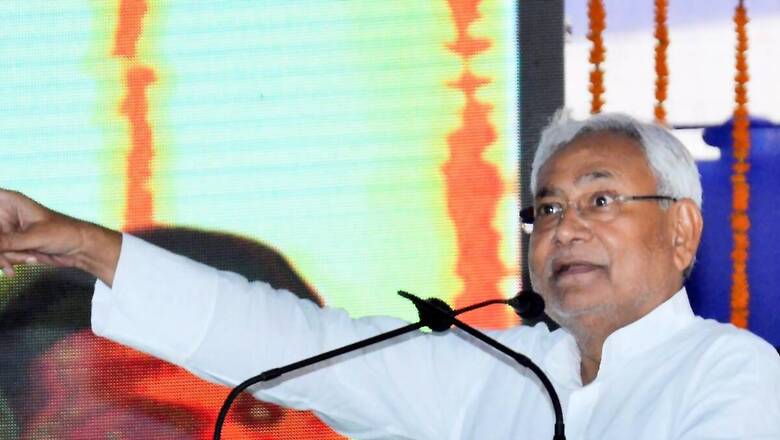
views
The Opposition in India is waking up, albeit slowly, to the need of uniting before the Lok Sabha elections early next year. And the person who has taken the lead in doing that is Bihar Chief Minister Nitish Kumar, who had been in the NDA camp till August last year. The plan is to “bring together as many Opposition parties against the BJP as possible”, and “chart a common path” by focusing on mutual agreements instead of disagreements.
For Nitish, it is his last-ditch effort to gain political relevance. And this battle is both personal and professional. He was a shining star in Indian politics in the late 2000s when Narendra Modi, then the chief minister of Gujarat, stole his thunder. In 2009, when the NDA under LK Advani lost the Lok Sabha elections to the Manmohan Singh-led UPA, Nitish thought his time in Indian politics had arrived. “The NDA’s 2009 defeat had left Nitish totally convinced Narendra Modi’s brand of politics was a game of diminishing returns,” writes Sankarshan Thakur in his book, Single Man: The Life and Times of Nitish Kumar of Bihar.
It was this conviction that made Nitish take the biggest gamble of his life: To dump the 17-year-old alliance with the BJP in 2013 on the Modi issue. Interestingly, Nitish had no qualms about being in the NDA as a Union minister in the Vajpayee government when Gujarat was actually scarred by the 2002 communal violence. He was not in power in Bihar then, and desperately needed to hold on to something in Delhi. So, Modi had to be ignored till the time of his choosing and convenience arrived. But when he became the Chief Minister of Bihar in 2005, there was wind under his wings. Nitish, to his credit, brought Bihar out of the “jungle raj”. In his first term, he was repeatedly named the “Politician of the Year” by several TV channels and newspapers. Even The Economist, which had once called Bihar “India’s armpit”, acknowledged the turnaround with a cheeky headline: “The Bihari Enlightenment: India’s most notorious state is failing to live up to its reputation.”
What further prompted the BJP-JD(U) breakup was the liberal/progressive propensity to unleash a heightened sense of importance among the political class by projecting it to be the sole guardian of avowed hallowed objectives — ranging from fuzzy liberalism to rootless secularism — though on the ground level, these mean nothing. By the end of his first term, Nitish found himself surrounded by this liberal circus, whose grandmaster was Amartya Sen. One incident just before the 2013 BJP-JD(U) divorce was enough to showcase the influence this clique had on Nitish.
Just three days before the acrimonious split, NK Singh, JD(U) MP and Nitish’s trusted aide, hosted a dinner in Cambridge. At the event, Singh asked Amartya Sen, “What, sir, do you think are the options before Nitish Kumar?” The Nobel laureate, who was then associated with Bihar’s Nalanda World University project, gave a well-thought-out reply: “Well, Nitish Kumar has several options, but only one honourable one.” That was the final straw in the BJP-JD(U) relationship.
For Nitish, unfortunately, Modi was an idea whose time had come by then, thanks primarily to a decade of UPA misrule when corruption cases had jumped by leaps and bounds. The era also saw willful misuse of the state machinery to not just target the majority community by putting a “saffron terror” tag on it, but also normalise minorityism by pushing forward the narrative of “Muslims having the first claim on resources”.
Nitish committed two cardinal mistakes in his political life: One, in 1989, when he fanatically supported Lalu Prasad Yadav to gain the leadership of the Opposition in Bihar — and then the position of the chief minister a year later. “Perhaps in Lalu, he (Nitish) saw a bumbler who he could remote control,” writes Sankarshan Thakur in Single Man, quoting an old party colleague. It cost him 15 years of political wilderness and personal humiliation. But despite these political and personal setbacks, Nitish retained a rare aura of being an honest, educated politician who would not compromise on his integrity.
Post-2010, he squandered that image too. First, his governance model took a beating. With his focus shifting to Delhi, though Nitish had vehemently denied such claims, his second term could not upscale the governance successes of the first term. To add to his woes was Nitish’s personal image taking a big hit. The change in his moniker from “Sushashan Kumar” to “Kurshi Kumar” was enough to suggest his slide. By the 2020 Assembly polls, which he again fought in alliance with the BJP, he had become a liability. He was seen as a politician who would do anything to be in power. In 2020, Nitish could barely scrape through riding on Modi’s personal popularity and the BJP’s well-oiled organisational machinery. His second divorce with the BJP, in 2022, was the final straw in the crisis of his credibility.
Lalu Prasad and his party, with a bankable Muslim-Yadav vote-bank, can afford to lose credibility and still score well over the 20 percent vote mark. Nitish never had this luxury. He, with just about 4 percent caste vote-bank, always needed credibility and the right kind of allies to propel his political career. With credibility gone, and by aligning with a party that decimates his entire political legacy of fighting the “jungle raj”, Nitish has been at a crossroads and probably in the twilight of his otherwise eventful political career. He has become a liability in Bihar politics, with the aggressive BJP and RJD slowly eating into his electoral base.
It is in this dismal backdrop that Nitish Kumar takes up the 2024 poll challenge on behalf of the rest of the Opposition. It’s actually a win-win scenario for him. He knows there’s nothing left for him in Bihar now. So, if, by accident, the Opposition manages to dislodge the Modi government in 2024, Nitish will get a fresh leash of political life, at least in Delhi. And it won’t be a first for him. For so many years in the 1990s and the early 2000s, he took refuge in Delhi when his going got difficult in Patna. Nitish hopes to do the same in the mid-2020s. History, after all, repeats itself. But then, to his hard luck, Indian politics has moved on.
The 2024 Lok Sabha elections are as much about Nitish’s political fate as they are about the destinies of other parties in the Opposition, especially the dynastic Congress led by Sonia Gandhi and her son, Rahul. The Bihar chief minister leading the charge against Narendra Modi only exposes the political bankruptcy of the Opposition camp.
The author is Opinion Editor, Firstpost and News18. He tweets from @Utpal_Kumar1. Views expressed are personal.
Read all the Latest Opinions here

















Comments
0 comment